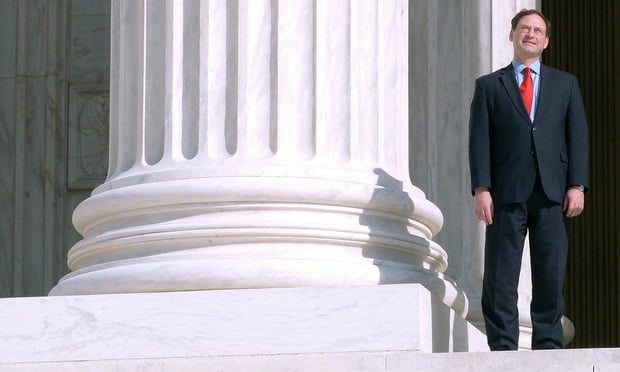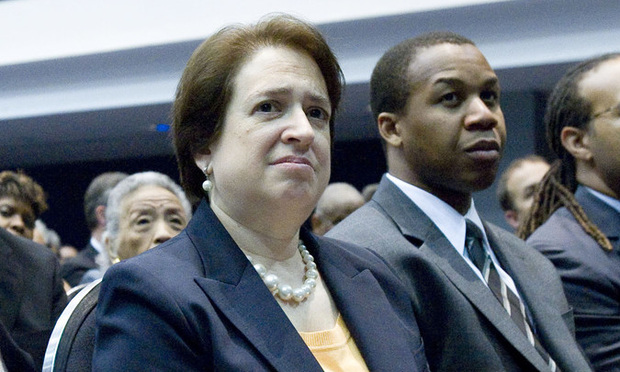Justices, Overturning Precedent, Restrict Labor Union Power to Collect Fees
Justice Samuel Alito Jr. wrote that the majority recognized that the loss of payments from nonmembers may cause unions to experience "unpleasant transition costs in the short term." However, he added, "We must weigh these disadvantages against the considerable windfall that unions have received under Abood for the past 41 years."
June 27, 2018 at 10:13 AM
7 minute read
 Justice Samuel Alito Jr. Credit: Diego M. Radzinschi / ALM
Justice Samuel Alito Jr. Credit: Diego M. Radzinschi / ALM
A sharply divided U.S. Supreme Court on Wednesday leveled a blow to public-sector unions by striking down fair-share fees charged to nonunion members for their costs of collective bargaining.
The 5-4 majority, led by Justice Samuel Alito Jr., split along ideological lines in holding that the fees, also known as agency shop fees, violated the First Amendment speech rights of nonunion members.
“Neither an agency fee nor any other payment to the union may be deducted from a nonmember's wages, nor any other attempt be made to collect such a payment unless the employee affirmatively consents to pay,” Alito wrote. “By agreeing to pay, nonmembers are waiving their First Amendment rights, and such a waiver cannot be presumed.”
There are nearly 11 million union-represented employees in 22 states that allow agency fees. More than half of those employees—7.8 million—are in the public sector, according to the U.S. Labor Department's Bureau of Labor Statistics.
In invalidating the fees in Janus v. AFSCME, the majority overruled its 1977 decision in Abood v. Detroit Board of Education, which had upheld the constitutionality of the fees. The Abood court found the burden on the First Amendment rights of nonunion members was outweighed by the need to promote labor peace and avoid free riders. The fees, however, could only be used to cover nonunion members' share of collective bargaining, not for political purposes, according to the ruling in Abood.
“Developments since Abood was handed down have shed new light on the issue of agency fees, and no reliance interests on the part of public-sector unions are sufficient to justify the perpetuation of the free speech violations that Abood has countenanced for the past 41 years,” wrote Alito.
Alito wrote that the majority recognized that the loss of payments from nonmembers may cause unions to experience “unpleasant transition costs in the short term.” However, he added, “We must weigh these disadvantages against the considerable windfall that unions have received under Abood for the past 41 years.”
Justice Elena Kagan, writing a dissent joined by Justices Ruth Bader Ginsburg, Stephen Breyer and Sonia Sotomayor, countered Alito.
 Justice Elena Kagan. Credit: Diego M. Radzinschi / NLJ
Justice Elena Kagan. Credit: Diego M. Radzinschi / NLJ“Rarely if ever has the court overruled a decision—let alone one of this import—with so little regard for the usual principles of stare decisis. There are no special justifications for reversing Abood. It has proved workable,” Kagan wrote. “No recent developments have eroded its underpinnings.”
Kagan said “most alarming” was that the majority had chosen “winners” by “turning the First Amendment into a sword and using it against workaday economic and regulatory policy.” Almost all such policy, she wrote, affects or touches speech.
“So the majority's road runs long,” Kagan added. “And at every stop are black-robed rulers overriding citizens' choices. The First Amendment was meant for better things. It was meant not to undermine but to protect democratic governance—including over the role of public-sector unions.”
Sotomayor wrote a brief separate dissent.
Abood had been reaffirmed by the Supreme Court at least five times in its four-decade history. The U.S. Justice Department, under administrations of both political parties, had defended Abood in the last 40 years—until last December. That's when the Justice Department, under U.S. Attorney General Jeff Sessions, took the opposite position in Janus.
Alito opened the door to a challenge to the fair-share fees when he wrote two opinions, one in 2012 and the other in 2014, in which he voiced doubts about their constitutionality. Anti-union organizations quickly mounted challenges, one of which made its way to the Supreme Court just one year after Alito's 2014 decision.
The outcome of the Janus challenge was seen by many as predictable.
In 2016, the justices split 4-4 in a case that also urged the court to overrule Abood. During arguments in that case, Friedrichs v. California Teachers Association, a majority appeared ready to overrule the precedent. But Justice Antonin Scalia died shortly after those arguments and the eight-justice court deadlocked, leaving in place the lower court ruling in favor of the union.
Justice Neil Gorsuch, who filled the Scalia vacancy, was expected to cast the decisive vote against the unions even though he had not addressed the issue as a circuit court judge.
During February arguments in Janus, Justice Anthony Kennedy appeared particularly hostile to the union side. The union, Kennedy told Illinois Solicitor General David Franklin, “can be a partner with you in advocating for a greater size workforce, against privatization, against merit promotion, against—for teacher tenure, for higher wages, for massive government, for increasing bonded indebtedness, for increasing taxes? That's the interest the state has?”
Ginsburg raised concerns about the potential impact of a ruling against the fees on mandatory bar association fees and student activity fees. Janus' counsel, William Messenger of the National Right to Work Foundation, said those fees were justified by compelling government interests.
Representing AFSCME, David Frederick of Kellogg Hansen Todd Figel & Frederick argued that the issue was whether states have the authority to set up a collective bargaining system in which unions are required to represent minority interests.
An amicus brief by Harvard Law's Charles Fried and Yale Law's Robert Post had offered the high court an alternative route to deciding the case.
The brief, written by Seth Waxman of Wilmer Cutler Pickering Hale and Dorr, urged the justices to consider the “statutory-duties test” proposed by Justices Antonin Scalia, Sandra Day O'Connor, Kennedy, and David Souter in the court's 1991 decision in Lehnert v. Ferris Faculty Association. Under that rule, contributions to a public-sector union “can be compelled only for the costs of performing the union's statutory duties as exclusive bargaining agent.”
The Janus challenge stemmed from a suit by Mark Janus, a child support specialist at the Illinois Department of Healthcare and Family Services, who objected to the $45 monthly deduction from his paycheck that goes to the local branch of the American Federation of State, County and Municipal Employees.
The U.S. Court of Appeals for the Seventh Circuit rejected his First Amendment challenge last March, saying, “neither the district court nor this court can overrule Abood, and it is Abood that stands in the way of his claim.”
Mark Mix, president of the National Right to Work Legal Defense Foundation, said in a statement Wednesday: “Today's decision is a landmark victory for rights of public-sector employees coast-to-coast that will free millions of teachers, police officers, firefighters and other public employees from mandatory union payments.”
The union fee challenge was one of two major labor cases before the justices this term. On May 21, a 5-4 majority ruled against workers and the National Labor Relations Board who challenged employers' mandatory arbitration clauses prohibiting class and collective actions in employment contracts.
In that trio of cases known collectively as Epic Systems v. Lewis, the Trump administration's Justice Department also reversed the prior administration's position by supporting the employers' position that the Federal Arbitration Act required enforcement of the class action bans.
The court's decision in Janus v. AFSCME is posted below:
Read more:
'He's Not Bashful' Ted Olson Evaluates Neil Gorsuch's Silence in Union Fees Argument
5 Key Moments From Supreme Court's Union-Fee Arguments
Neil Gorsuch Won't Need an Introduction From This Advocate in Union-Fee Case
This content has been archived. It is available through our partners, LexisNexis® and Bloomberg Law.
To view this content, please continue to their sites.
Not a Lexis Subscriber?
Subscribe Now
Not a Bloomberg Law Subscriber?
Subscribe Now
NOT FOR REPRINT
© 2025 ALM Global, LLC, All Rights Reserved. Request academic re-use from www.copyright.com. All other uses, submit a request to [email protected]. For more information visit Asset & Logo Licensing.
You Might Like
View All
Is 1st Circuit the New Center for Trump Policy Challenges?

Insurance Policies Don’t Cover Home Depot's Data Breach Costs, 6th Circuit Says

'Religious Discrimination'?: 4th Circuit Revives Challenge to Employer Vaccine Mandate
2 minute read
Standing Spat: Split 2nd Circuit Lets Challenge to Pfizer Diversity Program Proceed
Trending Stories
- 1Decision of the Day: Judge Dismisses Defamation Suit by New York Philharmonic Oboist Accused of Sexual Misconduct
- 2California Court Denies Apple's Motion to Strike Allegations in Gender Bias Class Action
- 3US DOJ Threatens to Prosecute Local Officials Who Don't Aid Immigration Enforcement
- 4Kirkland Is Entering a New Market. Will Its Rates Get a Warm Welcome?
- 5African Law Firm Investigated Over ‘AI-Generated’ Case References
Who Got The Work
J. Brugh Lower of Gibbons has entered an appearance for industrial equipment supplier Devco Corporation in a pending trademark infringement lawsuit. The suit, accusing the defendant of selling knock-off Graco products, was filed Dec. 18 in New Jersey District Court by Rivkin Radler on behalf of Graco Inc. and Graco Minnesota. The case, assigned to U.S. District Judge Zahid N. Quraishi, is 3:24-cv-11294, Graco Inc. et al v. Devco Corporation.
Who Got The Work
Rebecca Maller-Stein and Kent A. Yalowitz of Arnold & Porter Kaye Scholer have entered their appearances for Hanaco Venture Capital and its executives, Lior Prosor and David Frankel, in a pending securities lawsuit. The action, filed on Dec. 24 in New York Southern District Court by Zell, Aron & Co. on behalf of Goldeneye Advisors, accuses the defendants of negligently and fraudulently managing the plaintiff's $1 million investment. The case, assigned to U.S. District Judge Vernon S. Broderick, is 1:24-cv-09918, Goldeneye Advisors, LLC v. Hanaco Venture Capital, Ltd. et al.
Who Got The Work
Attorneys from A&O Shearman has stepped in as defense counsel for Toronto-Dominion Bank and other defendants in a pending securities class action. The suit, filed Dec. 11 in New York Southern District Court by Bleichmar Fonti & Auld, accuses the defendants of concealing the bank's 'pervasive' deficiencies in regards to its compliance with the Bank Secrecy Act and the quality of its anti-money laundering controls. The case, assigned to U.S. District Judge Arun Subramanian, is 1:24-cv-09445, Gonzalez v. The Toronto-Dominion Bank et al.
Who Got The Work
Crown Castle International, a Pennsylvania company providing shared communications infrastructure, has turned to Luke D. Wolf of Gordon Rees Scully Mansukhani to fend off a pending breach-of-contract lawsuit. The court action, filed Nov. 25 in Michigan Eastern District Court by Hooper Hathaway PC on behalf of The Town Residences LLC, accuses Crown Castle of failing to transfer approximately $30,000 in utility payments from T-Mobile in breach of a roof-top lease and assignment agreement. The case, assigned to U.S. District Judge Susan K. Declercq, is 2:24-cv-13131, The Town Residences LLC v. T-Mobile US, Inc. et al.
Who Got The Work
Wilfred P. Coronato and Daniel M. Schwartz of McCarter & English have stepped in as defense counsel to Electrolux Home Products Inc. in a pending product liability lawsuit. The court action, filed Nov. 26 in New York Eastern District Court by Poulos Lopiccolo PC and Nagel Rice LLP on behalf of David Stern, alleges that the defendant's refrigerators’ drawers and shelving repeatedly break and fall apart within months after purchase. The case, assigned to U.S. District Judge Joan M. Azrack, is 2:24-cv-08204, Stern v. Electrolux Home Products, Inc.
Featured Firms
Law Offices of Gary Martin Hays & Associates, P.C.
(470) 294-1674
Law Offices of Mark E. Salomone
(857) 444-6468
Smith & Hassler
(713) 739-1250










